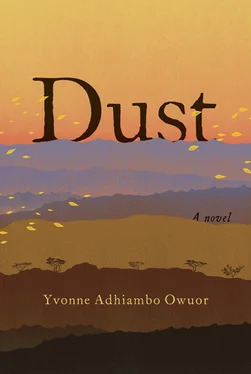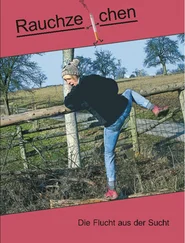Three semesters later, Odidi traveled home to Wuoth Ogik. In their third evening as a family, Odidi Oganda brought in the AK-47 that Nyipir, his father, had given him five years ago. He took it apart, then threw the pieces at Nyipir’s feet, chanting: Aye, aye, aye … I no go agree make my brother hungry, make I no talk …
Stillness.
Then Nyipir had stooped over the pieces.
Stillness.
Afterward, in the interlude of strokes from a hippo-leather whip that tore at Odidi’s body, Nyipir implored, “The only … war you fight … is for what belongs to you. You can’t live the songs of people who don’t know your name.”
Odidi had tried to shield his body, waiting to execute a rugby side-tackle, forgetting Baba was a seasoned military man. They wrestled across the floor. Crack . The breaking of Odidi’s left arm, his rugby ellipse-carrying arm. In Odidi’s stifled sorrow, the dying of grand rugby hopes that he realized right then he had nourished. He remembers Ajany waving her arms above her head, struggling to scream: “Stop!” Stuttering Sttttttttt over and over. Akai-ma cursed in Ngaturkana, summoning God and Catholic saints to witness the madness. She also offered to strip and show them her bare behind. A curse. But Galgalu struck the ground between father and son with a long, thick, herdsman’s stick. Thup!
Then there was silence.
Much, much later.
A father’s whispered entreaty to a fleeing son: Stay. Stay, please .
The son left.
Never bothered with an answer or even a backward look.
Now, years later, from a bitumen-smelling potholed backstreet, Odidi’s heart bleeds out his answer: Coming home. Wait for me .
Scent of return.
Burnt acacia-resin incense. Desert essences — dung, salt, milk, smoke, herbs, and ghee, the yearning for rain. Akai-ma said good smells melted bad spirits. We’ll meet our cows at sunset , Odidi promises. Home is the cream of hot milk of their animals, gulped down when Galgalu the herdsman was not looking, chewed-grass, slime-layered goat tongues on skin as they licked the stolen salt he and Ajany fed them with. Small Odidi watches Baba shave, his angular face lost in soft white lather, experiences again the wonder of Baba’s smooth-faced re-emergence. Baba winks. He is stretched out on his large, peeling tan leather armchair, head leaning back, a whiff of Old Spice, filled with big laughter. Just when Odidi would have thrown himself into Nyipir’s arms, a chill shadow crashes into him, stabbing into his body.
Now.
It stretches over him.
Odidi croaks, You!
It stares back, empty-socketed, and as noiseless as when they had first met. What do you want? Hollow hunger. Perpetual thirst. Here I am . The thing smiles. Odidi understands. If you touch her … Odidi shivers. Leave her alone . Cold tears. If it did not burn to do so, his teeth would chatter. Please . The shape watches Odidi’s seeping shadow flow into a twisted, dark-red cave, its den. Not her fault , Odidi pleads. I’m here .
Odidi and his sister Ajany’s December school holiday. Odidi, plotter of adventures, had decreed they should visit the forbidden, damask-stone cave to find the source of a stream they could hear but not see.
“No!” Ajany had stammered. “There’s bad in there.”
“How do you know?” Odidi scoffed.
“Akai-ma says …”
“We’ll find water at the base.” He had interrupted her. His words had separated and bounced back. Wa … Bassssssss … Ter … Wa … Sssssss …
So Ajany had placed her hand in his and followed him to the cave entrance that opened into a hollowed-out higgledy-piggledy grotto haunted by “God’s dazzling darkness” and seeping water. Damp pockets, points of light, and thick shadows that clung. Odidi had squashed his shoulders through trough-like passageways. Ajany followed. Tiny for her age, she could have strolled through. In two places they walked upright. Mostly they slithered on the hard, cold ground, dark skin tones blending in, inching forward on knees and hands. Abrupt left turn into a twisted chamber, into a triangle of light on jutting walls, which revealed yellow-and-red-shaded signs of bleeding spoors and giant footprints heading upward. There . The imprint of the world’s first record of laughter — open-mouthed toothiness carved into ancient rock. Pictograms. Space shimmering in between icons. They had whirled before the cave wall. “Mhhhhh,” Odidi had said, understanding where secrets are born. The too-muchness of experiencing, why silence is the language of last resort. They had laughed and laughed, peals of joy bouncing in the chamber. Ajany had skipped up and down before stumbling backward and falling on her bottom.
Crack! Ajany picked up what had been broken.
Odidi looked at what she carried and saw a white human finger bone, pointing at him. Ajany flung it away from herself. It had struck Odidi on his forehead. And when he had turned his face away, he had spotted the rest of the skeleton. The skull stained, grinning, and missing some teeth. Its sunken sockets stared at him then, as they did now.
“Where has its face gone?” Ajany had wailed, hand facing upward, her feet jumping, crashing down on the thing’s left hand. Odidi had stretched forward and picked Ajany up.
She gripped his neck, hiccupping. “It’s Obarogo! Odidi, Obarogo!”
And even as his life now leaks out, from the tarmac, Odidi chortles, He-he! Bubbles in his gullet. Obarogo! His sister consumed every story he fed her. Obarogo, the blind bogeyman born out of Odidi’s desire to hear his sister scream. Obarogo, who took life from the wool of darkness. Obarogo, who needed eyes in order to see in the dark and who sought out little girls whose eyes were open when they should have been asleep. Obarogo, of course, avoided boys.
They had raced away from the red cave, he half lifting, half shoving his sister ahead of him. Days after, Ajany, sucking on her two fingers, had dogged Odidi’s steps as they pastured livestock. She had yanked at his shorts. “ ’Didi, I dream of … of … Obaro … Oba …”
“Stop it!” Odidi had hissed, and whistled at the herding dogs. When he had looked back, he saw Ajany stabbing the earth with a twig. He shouted, “Soon we go back to school!”
Ajany had looked up at him with large, afraid-of-school eyes. The twig had fallen from her hands.
“We’ll go Far Away,” Odidi had whispered. Just as he had promised, “We’re going to real Kenya,” when he had learned of Baba’s decision to send them down-country to a boarding school south of the Ewaso Nyiro River.
Odidi and Ajany’s first vision of the school had been as a space demarcated from the rest of the universe by a massive black gate and an overgrown, almost dark-violet kai-apple fence that covered a thick wall. It was a misshapen world of gray stone edifices, a piteous tribute to an obscure English public school.
The headmistress, Mrs. Karai, M.Ed. Calabash-shaped. Stumpy. Stern. Ice. Yellow-brown, thin legs, faux-pearl necklace, and hornrimmed spectacles. After her New Year new-student assembly speech, on the morning of their second day, she summoned Odidi and Ajany to her office.
“Stand.”
They stood.
“No fighting, no stealing, no politics. Do you know how to use a toilet?”
No answer.
“I take that to mean ‘no.’ Matron will show you. I warn you. I smell trouble — you’ll see. You’ll know who I am, you hear?”
Touch and instinct were missing from Mrs. Karai’s words. Was reason also a sense? Odidi had gathered every fury that possessed him, had heard his sister grinding her teeth, knew she was unconscious of what she was doing. If he exploded, she might crash. So he had swallowed down rage and touched Ajany’s shoulder.
Читать дальше











